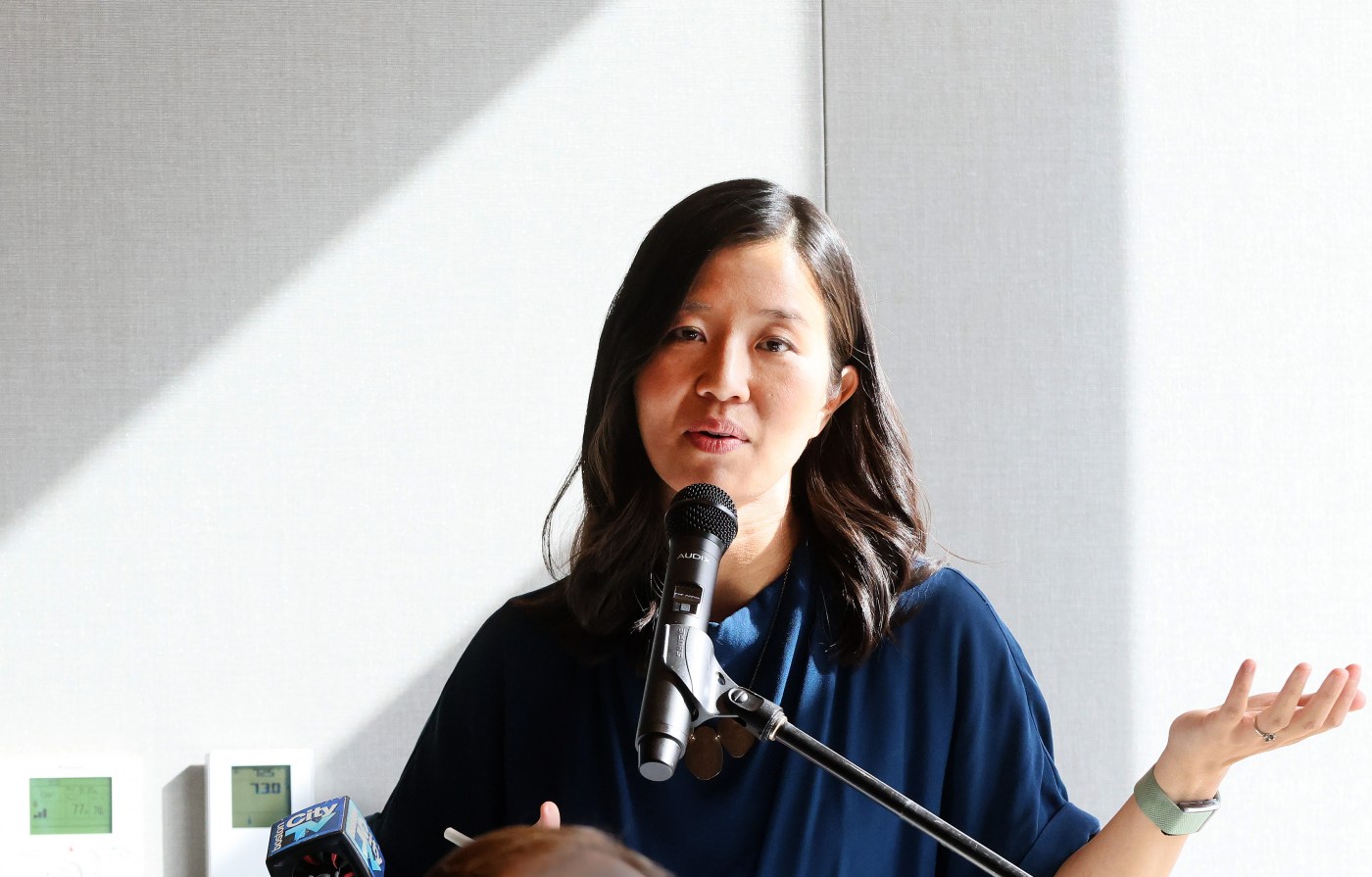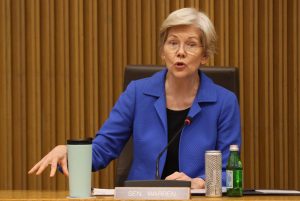
Boston Mayor Wu slams ‘false information’ that vacant office space will lead to $1B budget shortfall
Mayor Michelle Wu slammed watchdog report projections that the city’s eroding commercial tax base could leave Boston with a $1 billion budget shortfall in five years as “false information” while insisting that its financial outlook is strong.
Wu swiftly denied the report’s premise, saying that since the city is legally required to abide by state tax laws, a projected decline in commercial property values would shift more of the burden to, and increase taxes, for residential property owners, rather than lead to a loss in budgetary revenue.
She also called a city councilor’s push for a hiring freeze, informed by the findings of the report, “irresponsible.”
“To point to some false information that the city might be experiencing a billion dollar shortfall, that is just simply not true,” Wu said at a Wednesday event at City Hall where she formally unveiled her recommended budget for fiscal year 2025.
“There is no choice in the tax laws for us to be selective about how much we are taking or where we are taking it from,” Wu added. “It is laid out in the law, and if we do nothing, and if the commercial sector does experience the fall, it will automatically shift away from the ratio that we have had for decades, and that we want to preserve.”
While Wu stated at the budget breakfast that the “city is in a very strong position,” she acknowledged the likely continued decline of commercial property values driven by vacant office space when rolling out an “emergency law” last month that seeks to address that situation by raising commercial tax rates for four years.
Evan Horowitz, executive director of The Center for State Policy Analysis, who authored the report referenced by the mayor and issued February in conjunction with the Boston Policy Institute, said there is not a fundamental difference in what he and Wu are saying, in terms of her explanation disputing the report’s findings.
The report found that the city would either have to cut the budget by 10% or raise residential property taxes by 30% to deal with the projected loss in commercial tax revenue, which it states would lead to a more than $1 billion shortfall in five years. It further projects an annual revenue loss of $500 million after FY29.
The mayor is seeking to avoid that projected budget shortfall by raising commercial tax rates, Horowitz told the Herald Wednesday, saying that the report’s contention is that “things look really bad for commercial real estate.”
Related Articles
Boston Mayor Wu working to formalize rat czar position, administration official says
Boston Mayor Michelle Wu fires back on North End restaurateurs over outdoor dining
Boston city councilor calling for hiring freeze amid economic uncertainty
Michelle Wu rolls out $4.6 billion budget to Boston City Council with property tax warning
Pols & Politics: Boston City Council attendance scrutiny rattles pols
“It does feel like she doesn’t actually disagree,” Horowitz said. “We’re saying if you don’t raise rates there will be a big shortfall, and she’s saying there’s going to be a big shortfall so we’ll raise rates. That’s not a disagreement.”
It comes down, he said, to whether the city wants to raise rates or pay the shortfall. The mayor’s decision, he said, “feels to me like actually they’ve come around to understanding the challenge that they face in the decision.”
The Boston Policy Institute issued a stronger statement following the mayor’s remarks disputing the joint report, “The Fiscal Fallout of Boston’s Empty Office,” saying it is “the ghost of Christmas future, laying out what the next five years look like based on the best publicly available information.”
“If Mayor Wu and her administration is taking the issues BPI’s report identified seriously and preparing for every scenario, then the impacts of this decline can be mitigated,” the Boston Policy Institute said.
The mayor’s home rule petition, if approved by the City Council and state lawmakers, would allow municipalities to tax businesses beyond the state limit. Wu says the measure would help to avoid a significant increase in taxes for Boston residents next fiscal year, when the shift from the residential to commercial sector would increase from 175% up to 200%.
Wu said Wednesday that “we don’t anticipate that there’s going to be a major need for trying to rush into saving our economy,” given that “the indicators are very strong,” but added that her administration plans to focus on long-term infrastructure work to make downtown commercial offices attractive again.
“To suggest that we need to take drastic action or impose a hiring freeze or put some major changes on the table is simply irresponsible,” Wu said. “We are in a position to support our city workers, to deliver the services that our residents need, and we are going to continue speaking the truth about the economic situation of Boston.”
City Councilor Erin Murphy withdrew a resolution calling for a temporary hiring freeze later in the day at the Council meeting, after speaking with representatives from the major city worker unions, but plans to present “something with different wording soon” in collaboration with them.
“We all know that we’re entering treacherous waters here,” Murphy, who filed the resolution Monday, said. “We’re already in them, and they have ramifications across city government for all of our constituents. What’s vital moving forward is that all of our stakeholders have a seat at the table.”
Murphy had been calling for a hiring freeze through the end of the fiscal year that ends June 30 to “slow spending” amid the city’s economic uncertainty.
City Council President Ruthzee Louijeune thanked Murphy for withdrawing the resolution, saying, “We’ve heard from a number of unions who talked about how overburdened and overwhelmed they were and that we need to make sure that we’re hiring for the many positions.”
The Council held a hearing the prior day on filling long-term city job vacancies.


